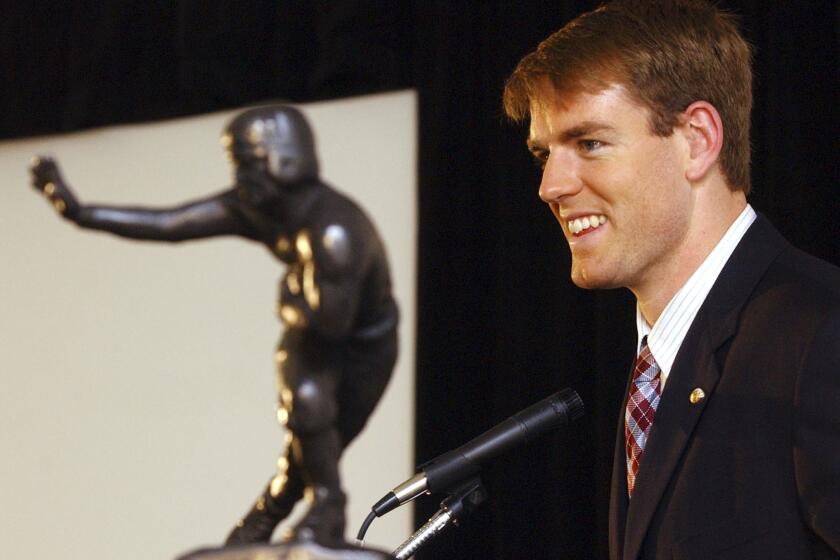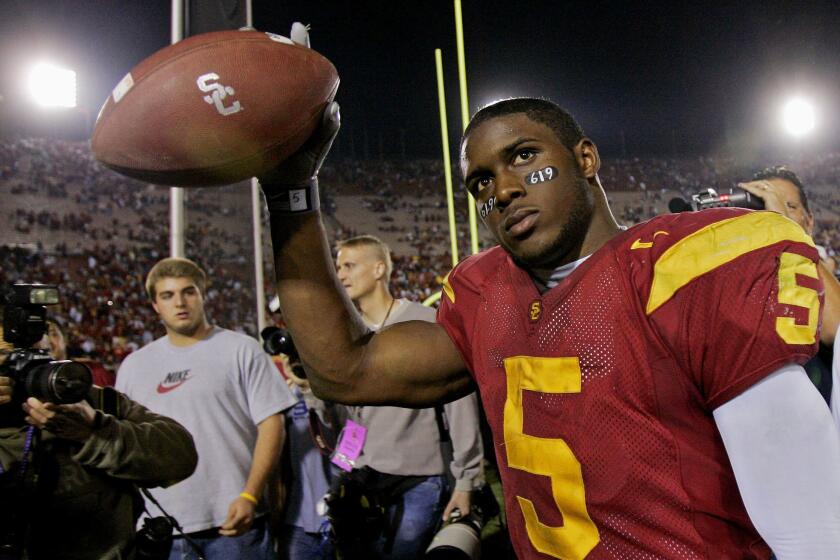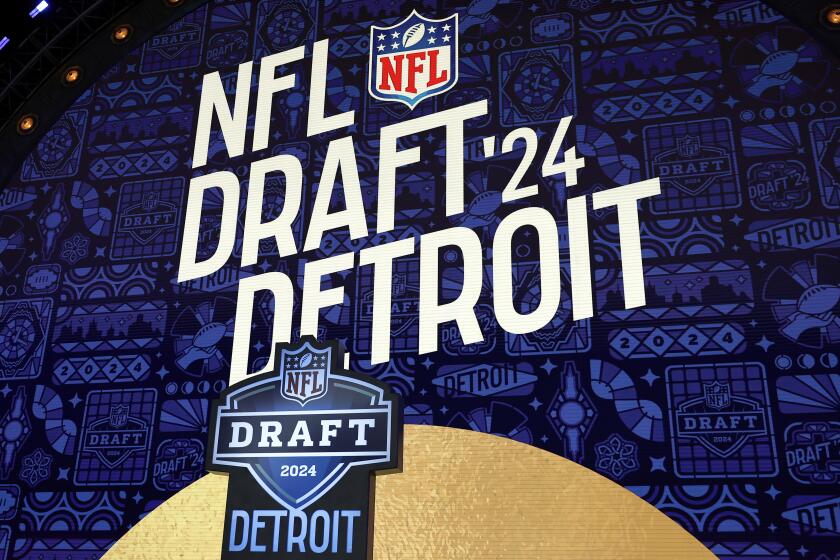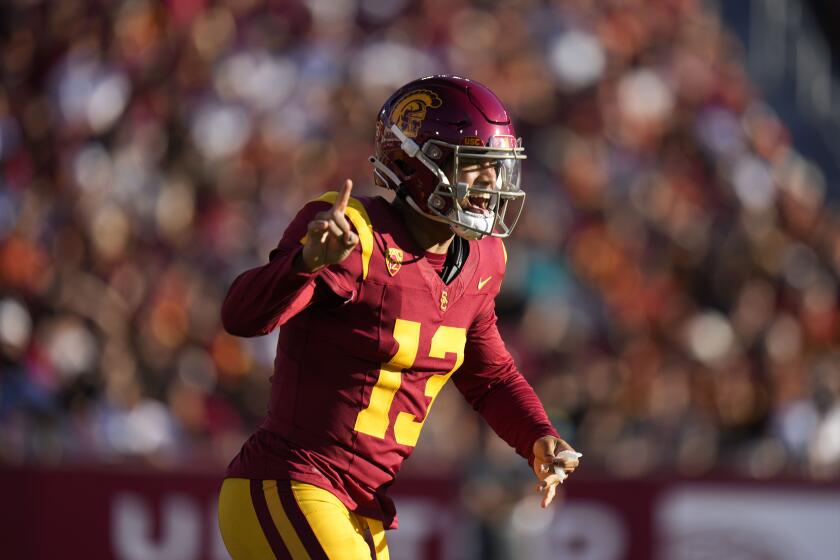A rush to high school’s end zone
The young quarterback rolled out and found himself, quite suddenly, alone. No linemen blocking, no receiver breaking open, only tacklers bearing down.
At that point, UCLA freshman Richard Brehaut realized he had turned right when the play was supposed to go left. It was only practice, but coaches pulled him off the field, yelling.
“I screwed up,” he said. “They got on me real good.”
Across town at USC, another new quarterback faced a subtler “Welcome to College” moment when he showed up for his first off-season meeting in January and looked around the room at older, larger players, some of them headed for the NFL next year.
“I don’t want to say it’s intimidating,” Matt Barkley recalled, “but you’re with a bunch of men.”
At a time of life when most of their peers are cruising through the final, breezy days of high school, Brehaut and Barkley have chosen a different route, pounding the books at college and dodging 280-pound linemen on the football field.
They belong to a rare but growing breed -- informally called “greenshirts” -- who finish their senior year early so they can enter college at midterm and join their new teams in time for spring practice. NCAA rules allow them to participate in scrimmages and months of off-season conditioning before the August date when freshmen usually report for training camp.
USC Coach Pete Carroll has watched the idea gain traction, which makes him wonder.
“I don’t try to talk guys into it,” he said. “I kind of go the other way.”
Carroll sees a trade-off: Young players gain football experience at the expense of memorable moments such as their prom or a few more months with childhood friends.
“Things that happen at the end of their senior year only happen once,” he said. “And even if it isn’t important to the kid, it’s important to the family.”
For many years, only a trickle of recruits arrived on campus ahead of schedule. According to an annual USA Today survey, there were 15 early enrollees at the 66 biggest football schools in 2002. But that number has risen, hitting 105 last year. This winter, preliminary tracking by the scouting website Rivals.com counted at least 103 greenshirts. The expectation is that this year’s total will surpass 2008’s.
The list includes blue-chip prospects such as Texas offensive lineman Mason Walters and Michigan defensive tackle William Campbell, as well as numerous top quarterbacks: Russell Shepard at Louisiana State, Cody Green at Nebraska, and Zach Mettenberger and Aaron Murray at Georgia.
“They have to learn what to do, the Georgia way of practice, meetings, lifting, running and just how to be a student at the college level,” Georgia Coach Mark Richt said.
As Texas Coach Mack Brown put it: “Their hearts are pumping pretty fast right now.”
That would fit Brehaut and Barkley as they embarked on college football, along with the challenge of tougher schoolwork and a new social stratosphere.
--
The two quarterbacks are comparable in size: over 6 feet tall, about 220 pounds. Both are fair-haired and self-assured in the manner of successful athletes.
For Barkley, the decision to enroll early had its roots in a childhood dream of playing for the Trojans. He couldn’t wait to get started.
The 18-year-old possessed a rocket arm and field savvy, the requisite pedigree as a top-ranked prep quarterback. Just as important, he had maturity -- a sense of “been there, done that” -- from starting all four years for the nationally prominent team at Mater Dei High in Santa Ana.
“He said, ‘Dad, I’m done with high school,’ ” recalled his father, Les, who played water polo for the Trojans in the late 1970s. “He pretty much had nothing else to accomplish.”
The history of greenshirts at USC encompassed only a dozen or so players over the last decade, including offensive lineman Jacob Rogers, safety Kevin Ellison and quarterback John David Booty, who arrived a full year early.
Barkley understood the challenges, saying: “If there’s any doubt, I think you should stay in high school. Have fun while you can.”
Determined to follow through, he began taking extra classes at Mater Dei a year ago, as a junior.
--
For Brehaut, spring always meant baseball, another sport he loved, so the senior at Los Osos High in Rancho Cucamonga had no plans to cut his final year short.
Then UCLA Coach Rick Neuheisel called. Last season, the Bruins’ starting quarterback threw far too many interceptions, so Neuheisel was opening up the competition for that spot.
“We just thought that if he was going to have a chance to be a legitimate contender in the fall, he was going to have to go through his growing pains in the spring,” Neuheisel said.
The suggestion sparked Brehaut’s competitive nature.
“His first reaction was, ‘Oh, yeah, I want to do that,’ ” said his mother, Yvonne. “We wanted him to take a moment, take a deep breath.”
A discussion ensued, no surprise in a home where the family kept a whiteboard with the pros and cons of each school that had recruited Brehaut.
“He was going to miss the fun of high school,” Yvonne said. “We wanted to make sure he understood that. And the fact that he would be increasing his workload academically.”
Though the 17-year-old appreciated his parents’ concern, the talk left Brehaut all the more committed to graduating early. He set about cramming a year of high school into a semester, taking seven classes a day plus two online courses at night. He did all of this while attending football practice every afternoon and leading Los Osos to a 10-3 record last fall.
“You’ve got to dedicate yourself,” he said.
--
The Barkleys and the Brehauts met this winter when their sons played in a high school all-star game in Florida. They talked about the future: “Is the family ready for a transition that occurs six or eight months before it’s supposed to?” said Barkley’s father, Les. “Is your son ready?”
There are plenty of greenshirt quarterback success stories, beginning with Eric Zeier, who helped popularize the practice in 1991 when he earned a starting spot midway through his freshman season at Georgia. North Carolina State’s Philip Rivers, Florida’s Heisman Trophy-winning Tim Tebow and Georgia’s latest star, Matthew Stafford, also parlayed their head starts into playing time as freshmen.
North Carolina State’s offensive coordinator during Rivers’ tenure? The man who currently holds the position at UCLA: Norm Chow.
“You know his history and you know what he can do for you,” Brehaut said. “You want to soak up everything he says.”
But early enrollment doesn’t always equal quick success.
Quarterback J.P. Losman entered UCLA ahead of schedule in 1999 and, unhappy with the Bruins’ offense and having to compete for the No. 1 spot, bolted after spring practice. Similarly, Brock Berlin left Florida for Miami when he could not unseat quarterback Rex Grossman.
The fact that Losman and Berlin ended up with successful careers helped convince many coaches that quarterbacks benefit from an early start.
“There’s so much to learn,” Florida State Coach Bobby Bowden said. “If anybody needs extra time, it’s them.”
He added: “When the fall rolls around, they’re way ahead of everyone else” in their class.
At USC, Barkley has proved to be a quick learner, poised on the field, using that arm strength to complete tough throws.
But there have also been miscues, including a screen pass in a recent scrimmage that was intercepted and returned for a touchdown, a play that Carroll described as a “bonehead pick.”
Freshman stumbles have kept Barkley at No. 2 on the depth chart, not quite what he was hoping for.
“Of course he’s the rookie by himself, and we let him know that every now and then,” junior receiver Damian Williams said. “But if he makes a mistake, you’ve got to be there to pick him up.”
It helps that Barkley shares an apartment with former Mater Dei teammates who came to USC a year earlier. His schedule, loaded down with 17 units of general education classes, doesn’t leave time for homesickness.
“If I look back in the fall and, heaven forbid, I’m not the starting quarterback, I know I put in the extra hours,” he said. “I’m proud of myself.”
At UCLA, Brehaut has thrown the ball accurately, completing better than half his passes in two scrimmages so far. But he too is trailing in the quarterback race, his learning curve occasionally measured by the number of push-ups he must do after blowing calls in the huddle.
--
Spring practice ends today for both USC and UCLA. The teams will hold scrimmages, finishing a month in which players spent 13 or more hours a week at practice and meetings, and additional time lifting weights on their own. Brehaut talks about eating a quick banana for breakfast as he rushes out the door.
Early on, his mother spoke to him on the phone and recalls hearing a voice that sounded disconnected, a brain overflowing with English composition, sociology and playbook study before bedtime.
“You go from class to meetings to eating to practice to homework,” Brehaut said. “The biggest thing is balancing everything.”
For now, if universities “look at a student and are comfortable bringing him in at midterm . . . we’re going to allow them to do that,” said Kevin Lennon, the NCAA’s vice president for membership services.
But officials are concerned about the pressure on young student-athletes. They have noticed the beginnings of a similar trend in baseball and are eager to see how growing numbers of early enrollees fare academically.
The coaches at USC and UCLA have kept an eye on their new quarterbacks for another reason: morale. Barkley is the only greenshirt on his team. Brehaut has just one peer -- Morrell Presley, a tight end from Carson High -- though he has gotten support from another quarterback, Nick Crissman, who has been with the Bruins almost a year.
“You don’t have a whole freshman class around you,” Neuheisel said.
Still, Brehaut and Barkley say they are having fun. Both live close enough to drive home on weekends and keep in touch with old friends, and both will attend their high school graduations. Last weekend, Brehaut went to his prom.
If the UCLA freshman harbors thoughts of sacrifice, they are fleeting.
“I’m so glad I’m not sitting back in fifth period bored out of my mind,” Brehaut said.
Asked if they have any regrets, the two players give the same response.
They prefer to look forward, learning from their mistakes, improving on the field. No matter how long it takes.
--
Go beyond the scoreboard
Get the latest on L.A.'s teams in the daily Sports Report newsletter.
You may occasionally receive promotional content from the Los Angeles Times.




